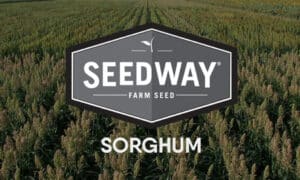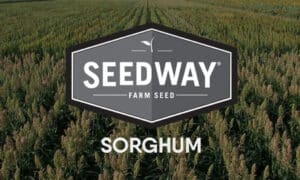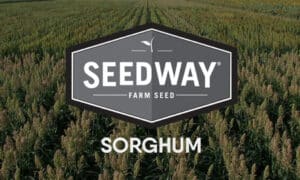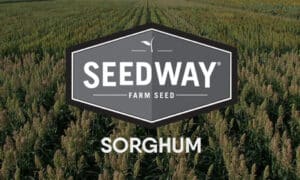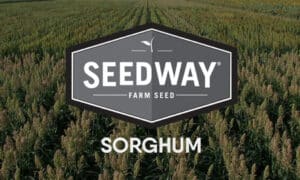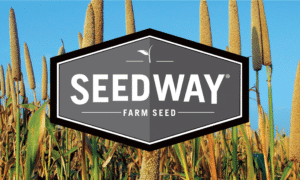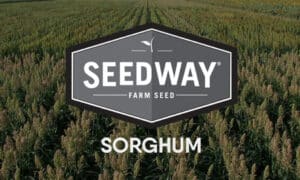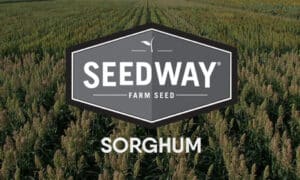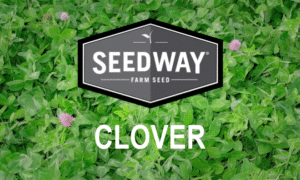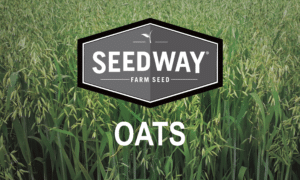Filter Products-
-
Maturity
-
Maturity Days
-
Stalk Strength
-
SSA 181 BMR6 DS (Forage Sorghum)
Learn more →SSA 181 BMR6 DS (Forage Sorghum) is a brown midrib, male sterile hybrid forage sorghum. Because the lignin content of the stalk has been dramatically reduced, digestibility improves by 35% over conventional forage sorghums. SSA 181 BMR6 DS forage sorghum, with this improvement in digestibility and palatability, can equal the milk production of corn. Plant at the recommended rates for your area and harvest timely for optimum yield and quality. The water requirement for SSA 181 BMR6 DS is 1/3 less than would be required to produce an equivalent amount of corn. Because SSA 181 BMR6 DS is a male sterile hybrid, volunteer growth is not an issue provided there is adequate isolation from pollen fertile sorghums.
-
SSA 191 BMR6 BD (Brachytics Dwarf Forage Sorghum)
Learn more →SSA 191 BMR6 BD is a brachytic dwarf, brown midrib, grain producing hybrid forage sorghum. Because the lignin content of the stalk has been dramatically reduced, IVDMD is 40% greater than conventional forage sorghums. SSA 191 BMR6 BD with this improvement in digestibility and palatability, can equal the milk production of corn with a water requirement 1/3 less than would be required to produce an equivalent amount of corn. Because SSA 191 BMR6 BD is a grain producing hybrid, energy will increase as carbohydrates form in the grain head. Plant at the recommended rates for your area and harvest timely for optimum yield and quality.
-
SSA 251 BMR6 DS (Dry Stalk Hybrid Sorghum-Sudan)
Learn more →This hybrid produces a high tillering high quality forage that has excellent early vigor. The high leaf to stem ratio means that you can count on high protein. The digestibility of this hybrid has been increased by 20% due to the BMR 6 trait. The dry stalk gene allows a more timely harvest and helps to get the crop bailed and out of the field before it gets rained on while drying. Typically this hybrid is used in a rotational grazing or 1-3 cutting system allowing you to produce the maximum amount of forage.
-
SSA 252 BMR6 (Hybrid Sorghum-Sudangrass)
Learn more →SSA 252 BMR6 produces some of the highest dry matter yields of any BMR and non-BMR hybrid sorghum-sudangrass commercially available with excellent nutritional quality and early vigor. SSA 252 BMR6 is highly digestible with increased efficiency and improved animal utilization due to reduced lignin, the limiting factor in forage digestibility. This hybrid has excellent drought tolerance and is quick growing, allowing the maximum tonnage in the shortest amount of time. Fine sweet stems makes SSA 252 BMR6 an excellent choice for grazing, hay, greenchop and silage.
-
SSA COW VITTLES II (Hybrid Forage Sorghum)
Learn more →SSA Cow Vittles II is a conventional hybrid forage sorghum with high yield potential. A dense lush leaftype with a large grain head. Cow Vittles II sets the standard for forage sorghums. Generally used South of I80.
Seed at 7-11 lbs. per acre. -
SSA Dwarf BMR Pearl Millet
Learn more →Dwarfing gene; improves standability, and increases leaf to stem ratio. BMR gene technology for improved feed intake and digestibility. Excellent disease resistance package.
-
SSA GREENGRAZER V (Hybrid Sorghum-Sudangrass)
Learn more →SSA GREENGRAZER is a small-seeded three way cross with thin stems that are highly palatable. Regrowth after cutting is very fast. SSA GREENGRAZER is a dark green color and also possesses the Green Top trait, which allows for further extension of the plant. Planting SSA GREENGRAZER at higher populations per acre will result in a finer stemmed forage. Finer stems will allow the forage to dry faster for higher quality hay than is possible with thick stemmed types.
-
SSA Leafy Pearl Millet
Learn more →Hybrid with yield potential of 3 – 6 dry matter tons. Widely adapted to many regions for continuous grazing and/or forage production. No prussic acid concerns. SSA Leafy Pearl Millet is a hybrid type pearl millet producing quick high yields. It only requires 60 days to the boot stage. It has good tolerance to many pathogens and high humidity. With its short plant stature, means that the forage produced is virtually all leaves. This high leaf mass assures SSA Leafy Pearl Millet very high protein concentrations and high TDN values.
-
SSA M31 BMR6 DS (Leafy BMR 6 Hybrid Sudangrass)
Learn more →SSA M31 BMR6 DS is a BMR 6 Hybrid Sudangrass. The BMR 6 gene added to a sudangrass hybrid adds the high quality to a plant that has fine stems and quick regrowth. This hybrid will have fast dry down so it can be used in areas that have trouble putting sorghum sudan up as dry hay. Seed at 25-30 lbs. per acre.
-
SSA M32 BMR6 DSBD (Brachytic Dwarf Hybrid Sudangrass)
Learn more →SSA M32 BMR6 DSBD is the first BMR-6, brachytic dwarf hybrid sudangrass to hit the market. The BMR-6 gene adds high digestibility to a plant that has very fine stems and tremendous regrowth. The brachytic dwarf trait adds a much tighter distance between internodes, allowing for lower cutting/grazing height and better standability. The dry stalks trait allows for quick drydown, making this one of the most versatile forage products on the market.
-
STAMINA White Clover
Learn more →A new intermediate- type white clover with high stolen density helping it spread aggressively and rootdown avoiding hoof and grazing pressure. Excellent yield and persistence for a long haul clover.
-
Steuben Spring Oat
Learn more →
Strong yielder with excellent standability. 8 bushel yield advantage and improved test weight over Corral in 6 years of testing at Cornell University. Strong resistance to current races of Crown Rust. White hull color similar to Hayden.
